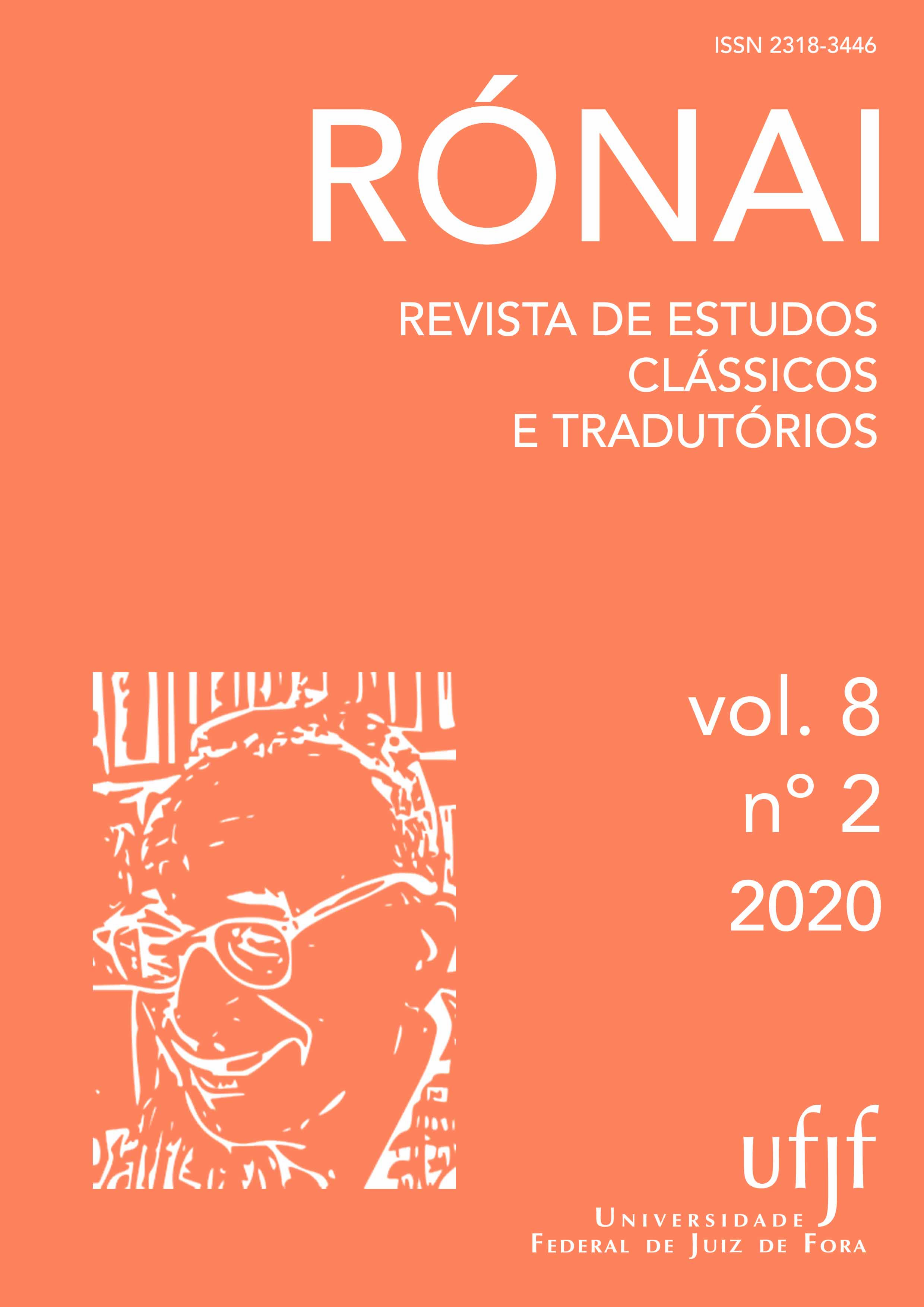A introdução da psicologia moral no argumento do ergon
DOI:
https://doi.org/10.34019/2318-3446.2020.v8.32068Palabras clave:
ergon argument, moral psychology, virtues, Aristotle, Nichomaean EthicsResumen
In this paper, I discuss in detail one of the first conclusions drawn by Aristotle in the ergon argument. The paper provides an in-depth approach to Nicomachean Ethics’ lines 1098a3-4, where one reads: “λείπεται δὴ πρακτική τις τοῦ λόγον ἔχοντος”. I divide the discussion into two parts. In the first part, I put under scrutiny how one should take the word “πρακτική” and argue that one should avoid taking this word as meaning “practical” in the passage. I will argue in favor of taking it as meaning “active”. The exegetical inconvenience of taking “πρακτική” as meaning “practical” is the fact that it restricts the results achieved in the ergon argument by excluding the possibility of contemplation being considered a eudaimon life. In the second part, I discuss the expression “λόγον ἔχον” and provide some arguments to take it as preliminarily introducing the
criterion of division of the virtues that will be spelled out in EN I.13 so that the λόγον-ἔχον part of the soul here also makes reference to the virtue of the non-rational part, i.e., virtue of character. I offer a deflationary view by showing that the moral psychology is developed in EN I.7 within the limits imposed by the ergon argument.
Descargas
Citas
ANGIONI, L. Phronesis e Virtude do Caráter em Aristóteles, Comentários a Ética a Nicômaco VI. Dissertatio [34], p. 303-345, 2011.
BROADIE, S. and ROWE, C. Aristotle: Nicomachean Ethics. New York: Oxford University Press, 2002.
BYWATER, I. Aristotelis: Ethica Nicomachea. New York: Oxford University Press,1894.
BURNET, J. The Ethics of Aristotle. London: Methuen & Co, 1900.
CRISP, R. Aristotle: Nicomachean Ethics. Translated and Edited. Cambridge: Cambridge University Press, 2000.
ENGBERG-PEDERSEN, T. Aristotle’s Theory of Moral Insight. New York: Oxford University Press, 1983.
FORTENBAUGH, W. W. Aristotle’s Practical Side On His Psychology, Ethics, Politics And Rhetoric. Leiden/Boston: Brill, 2006.
GAUTHIER, R. A.; JOLIF, J. Y. L’Éthique à Nicomaque: introduction, traduction et commentaire. Tome I, Introduction et Traduction. Louvain: Publications Universitaires de Louvain; BéatriceNauwelaerts, 1958.
GAUTHIER, R. A.; JOLIF, J. Y. L’Éthique à Nicomaque: introduction, traduction et commentaire. Tome II, Commentaire, Première Partie, Livres V-X. Louvain: Publications Universitaires de Louvain; BéatriceNauwelaerts, 1959.
INWOOD, B. (ed.). Oxford Studies in Ancient Philosophy. Vol. XXXVII, 2009.
IRWIN, T. H. Aristotle on Reason, Desire, and Virtue. The Journal of Philosophy, Vol. 72, No. 17, Seventy-Second Annual Meeting of the American Philosophical Association Eastern Division, p. 567-578, 1975.
IRWIN, T. H. Aristotle: Nicomachean Ethics. Indianapolis: Hackett, 1999.
JOACHIM, H. Aristotle: The Nicomachean Ethics. Oxford: Oxford University Press, 1951.
KRAUT, R. Aristotle: Politics Books VII and VIII. Translated with a Commentary. Clarendon Aristotle Series. Oxford: Clarendon Press, 1997.
LAWRENCE, G. The Function of the Function Argument. Ancient Philosophy 21, p. 445-475, 2001.
LIDDELL, H. G. and SCOTT, R. Greek-English Lexicon. Ninth Edition Revised Supplement. Clarendon Press: Oxford, 1996.
LORENZ, H. Virtue of Character in Aristotle’s Nicomachean Ethics. Oxford Studies in Ancient Philosophy. Vol. XXXVII, 2009.
MOSS, J. “Virtue Makes the Goal Right”: Virtue and Phronesisin Aristotle’s Ethics. Phronesis, 56, p. 204-261, 2011.
MOSS, J. Aristotle on the Apparent Good: perception, phantasia, thought, and desire. Oxford: Oxford University Press, 2012.
OLIVEIRA, A. A. P. de. Virtude do Caráter e Phronesis na Ethica Nicomachea. Dissertação (mestrado) – Universidade Estadual de Campinas, Instituto de Filosofia e Ciências Humanas, Campinas, 2017. Disponível em: http://www.repositorio.unicamp.br/handle/REPOSIP/330304
ROSS, W.D. Aristotelis: De Anima. Oxford: Oxford University Press, 1956.
ROSS, W.D. Aristotelis: Politica. Oxford: Oxford University Press, 1957.
ROSS, W.D. Aristotelis: Ars Rhetorica. Oxford: Oxford University Press, 1959.
ROSS, W. D. Aristotle: Nicomachean Ethics. Revised with an Introduction and Notes by Lesley Brown. Oxford: Oxford University Press, 2009.
SHIELDS, C. Aristotle: De Anima. Translated with an Introduction and Commentary. Oxford: Clarendon Press, 2016.
STEWART, J. A. Notes on the Nicomachean Ethics of Aristotle, Vol. I. Oxford: Clarendon Press, 1892.
TRICOT, J. Aristote: Éthique à Nicomaque. Introduction, Traduction, Notes et Index. Paris: Librairie Philosophique J. Vrin, 2007.
Descargas
Publicado
Cómo citar
Número
Sección
Licencia
Derechos de autor 2020 Angelo Antonio Pires de Oliveira

Esta obra está bajo una licencia internacional Creative Commons Atribución 4.0.
Derechos de autor
Los autores que publican en esta revista aceptan los siguientes términos:
1. Los autores y las autoras conservan los derechos de autor y le otorgan a la revista el derecho a la primera publicación, que está bajo la licencia Creative Commons Attribution License 4.0 Internacional.
2. Los autores y las autoras pueden publicar y compartir el trabajo con reconocimiento de la publicación inicial en esta revista.
3. Los autores y las autoras de las obras aprobadas autorizan a la revista a asignar el contenido de sus obras, después de la publicación, para su reproducción en indexadores de contenido, bibliotecas virtuales y similares.
Para obtener más información sobre Creative Commons Attribution License 4.0 Internacional, acceda a: https://creativecommons.org/licenses/by/4.0/deed.es
Exención editorial
El contenido de los artículos publicados es responsabilidad única y exclusiva de sus autores, y no representa la posición oficial de Rónai - Revista de Estudos Clássicos e Tradutórios o de la Faculdade de Letras de la Universidad Federal de Juiz de Fora o instituciones asociadas.



